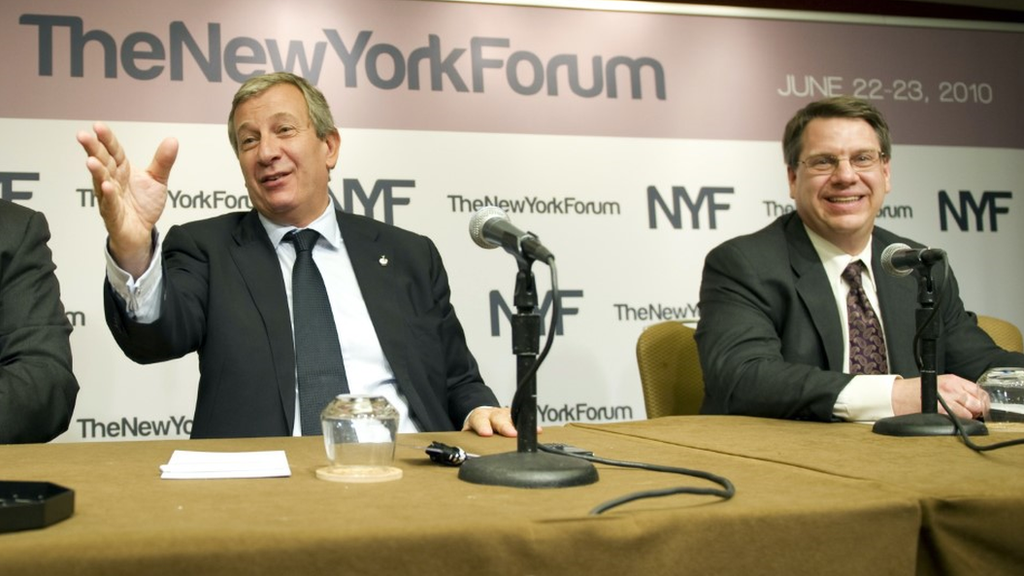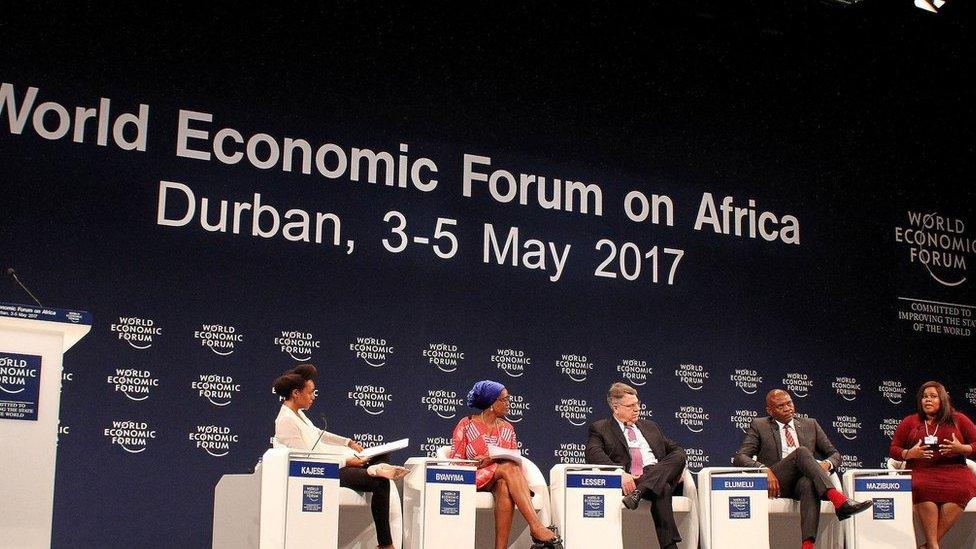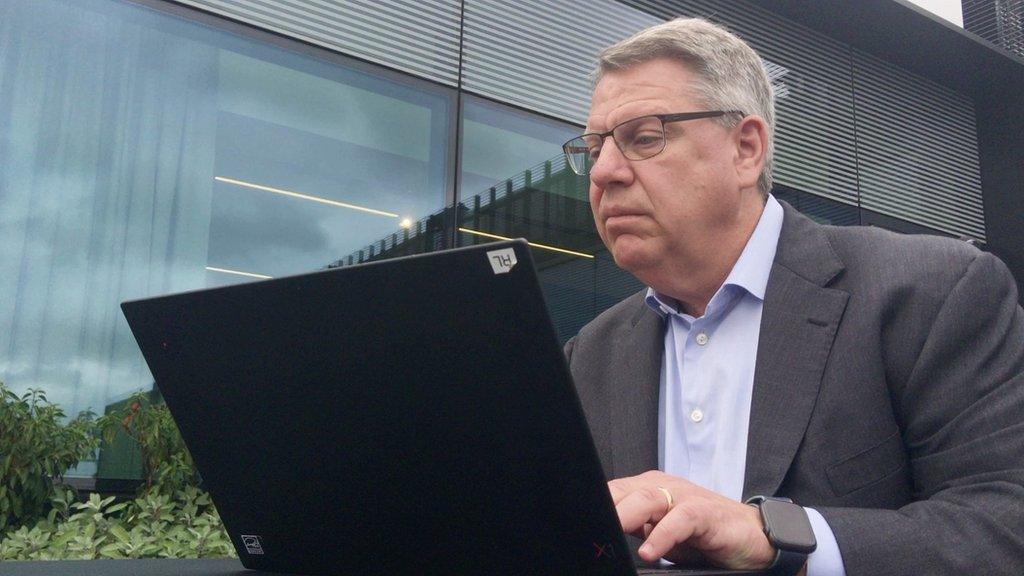CEO Secrets: Rich Lesser of BCG shares his advice
- Published
WATCH: Rich Lesser shares his CEO Secrets
Rich Lesser, head of global firm Boston Consulting Group, thinks CEOs of large companies exist in a "bubble". He explains why he had to burst his own in order to grasp the importance of climate change, for our business advice series, CEO Secrets.
Boston Consulting Group (BCG) is a management consultancy firm employing more than 22,000 people in offices dotted around the world, with annual revenues of more than $8bn.
Rich Lesser joined it straight out of graduate business school in 1988, after training as a chemical engineer, and spent a quarter of a century rising up the ranks. He became CEO in 2013, a role he stepped down from at the end of this September, to become global chairman.
Mr Lesser explains why "CEO bubbles" form.

Mr Lesser (r) in 2010, three years before he became CEO at BCG
"When you're at the top of the hierarchy, you have a lot of influence over people's careers. There is a natural tendency for people to start to say things that they think you want to hear, that align with your world view, or make you happy."
The bubble forms slowly, Mr Lesser explains, because at first your peers still see you as something of an equal, they know you and your background. But over time, he says, a "gap starts to emerge", between the CEO and everyone else.
As a result CEOs need to proactively create environments where meaningful debate is fostered.
"I try to celebrate someone when I am wrong and they are right," says Mr Lesser, "that's how you break the bubble".
An example of this is climate change, he says, which he admits he was slow to grasp the importance of when it came to changing his firm's own culture and practices.
"We were already acting to address climate change but not as boldly as we needed to, and I had partners in BCG who pushed back very strongly on me, educating our broader partnership."
One senior partner in Germany even took matters into his own hands, sending an internal, group email with a self-made video warning of the dangers of inactivity on climate change.

Mr Lesser is part of the World Economic Forum's Alliance of CEO Climate Leaders
It was potentially awkward for Lesser to take a clear stance on this issue, since BCG has big clients in the oil industry, not to mention the political implications in the United States, especially during the Trump administration.
"But those partners [who challenged me] turned out to be right," says Lesser, "it changed our trajectory and helped me break through my bubble."
A chance factor that helped to change BCG's trajectory was in fact the Covid-19 pandemic, which forced the firm to re-think its traditional working models, in a way that helps meet climate targets.
Management consultants and the multinational corporations they serve are known to be some of the worst offenders when it comes to carbon emissions, due to their business travel.
Before the pandemic, consultants would typically crisscross the globe on red-eye flights to hold short face-to-face meetings with clients.
"It used to be one of the hardest lives, because they'd be sometimes in two or three continents a week," says Mr Lesser, "but we Zoom from one place to the next now."
As well as being greener, this means clients can access a variety of expertise more easily, he argues.

Management consultants now more often offer their expertise via video call
Last September, BCG committed to reducing greenhouse-gas emissions by cutting full-time employees' travel by 30% by 2025. It has also pledged to cut its net carbon emissions to zero by 2030.
Since breaking his bubble, Lesser has joined the World Economic Forum's Alliance of CEO Climate Leaders. He will be attending the COP26 talks in Glasgow in early November.
So what tangible results would he like to see, from what's seen as a crunch conference?
"We never get as far as we would ideally want, it's just too hard politically," says Mr Lesser, "but it's not a zero or a one hundred game."
An acceleration of the national commitments to reduce the carbon output of the global economy, with extra help for developing countries to adapt, is necessary, he reckons.
But he would also like politicians to give clear directions to large businesses as they seek to reduce their carbon emissions.
"I'd like to see a price on carbon, it's an externality that should be priced for, that will make it easier for companies to make investments and commit and go faster."
And he would like to see protection for companies that commit to change.

Mr Lesser will be attending the COP26 conference in Glasgow
"Companies that go first are nervous, rightfully nervous," says Mr Lesser.
"They will make these big investments and they are going to be left holding the bag because customers are not going to be ready to pay more for products.
"So we need to be able to protect these first movers through some sort of border adjustment mechanisms, or other ways to prevent the punishing of the companies that are bold and invest."
"It's an incredibly important conference, but I don't think any of us know whether in the end we will look back on it as a great success or something that came up short of what we need."
As he steps down as BCG's CEO after more than three decades with the company, succeeded by Christoph Schweizer, Mr Lesser notices a change in the mindset amongst the newest recruits - something apparent in other companies too.
The new generation wants a clear sense of purpose from businesses, to give meaning to their working lives, says Mr Lesser.
"They want clear intent of what you are trying to achieve in the world, with real life examples, and you have to animate them. That's very different to even a decade ago, when most companies had a shareholder value mindset that, unfortunately, too often translated into short-term performances."
To harness that energy, other CEOs may be forced to burst their bubbles.
You can follow business reporter Dougal Shaw on Twitter: @dougalshawbbc, external